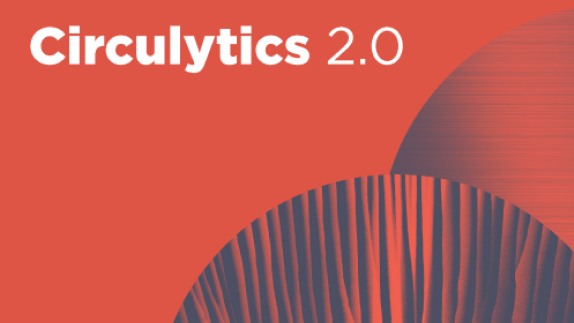Companies around the globe are adopting the circular economy as an opportunity to create thriving businesses that meet the challenges of global issues such as climate change and pollution
Circulytics, a new digital tool from the Ellen MacArthur Foundation, will equip companies with the most comprehensive picture of their circular economy performance
By using company-level data, and applying insights and analysis from the Ellen MacArthur Foundation, Circulytics will help to highlight opportunities for innovation and allow companies to track their progress
Over 30 companies, including Brambles/CHEP, DS Smith, and Enel, are among those to have been involved in the development and testing of the new tool.
The Ellen MacArthur Foundation has today (Tuesday, January 14) launched a new tool that will provide businesses with a unique opportunity to measure their circular economycircular economyA systems solution framework that tackles global challenges like climate change, biodiversity loss, waste, and pollution. It is based on three principles, driven by design: eliminate waste and pollution, circulate products and materials (at their highest value), and regenerate nature. performance.
Businesses are under growing pressure to move beyond solely measuring impact in terms of revenue, profit, and shareholder value. Increasingly, they are recognising their responsibility and power to play a key role in addressing some of the world’s most pressing challenges, such as climate change and pollution. There is growing understanding that the circular economy can deliver critical solutions to address these global challenges, while creating new opportunities for companies to thrive in the long term.
To make strategic decisions that lead to the best outcomes, companies need access to the right data. To date however, measuring the circularity of an entire business, not just its products, has been difficult. This can slow the adoption of circular economy practices and has made it harder for businesses to fully capitalise on the opportunities they represent.
Circulytics is a tool that helps companies understand the full extent of their circular economy performance with supporting insights from the Ellen MacArthur Foundation. It can help companies identify opportunities for improvement, and gives them the ability to track progress against key metrics over time.
“Over the past ten years our work has helped to show the circular economy is not only a multi-trillion dollar economic opportunity, but a vital part of the solution to some of the biggest challenges we face today, including climate change and environmental damage. Many businesses are starting to embrace this opportunity, but for the transition to happen at speed and scale they need accurate data and clear analysis. Our ambition for Circulytics is to help any business, in any industry, anywhere in the world recognise and unlock the potential of the circular economy,” said Andrew Morlet, CEO of the Ellen MacArthur Foundation.
Companies will receive a report featuring a Circulytics score alongside tailored insights and commentary from the Ellen MacArthur Foundation. The process is designed to enable businesses to fully realise circular economy opportunities to generate revenue, design out waste, keep materials and products in use, and create environmental benefits. It will provide comprehensive tracking of company progress against key measures and deliver unprecedented clarity about circular economy performance, opening up new opportunities to generate brand value with key stakeholders. Companies will choose whether they publish their results.
Circulytics has been developed and tested by more than 30 companies from the Ellen MacArthur Foundation’s network, including Brambles/CHEP, DS Smith, and Enel.
How Circulytics works
Circulytics will work with companies to gather data relating to the application of circular economy in key areas of their activity:
Strategy Have you placed circularity in the heart of your strategy?
People and Skills Have you employed the skills and people required to transition to a circular economy business model?
Systems, processes and infrastructure Have you invested sufficiently to support the transition?
Innovation Are you developing new circular products, systems or services?
External engagement Are you promoting your circular economy initiatives and influencing others such as your clients and supply chain?
Inputs Are the materials and energy used in your business processes supporting a circular economy?
Outputs Are the products and services you produce supporting a circular economy?
For more details or to request an interview, please contact:
Charlotte Martin +44 (0)207 413 3027 charlotte.martin@hkstrategies.com
Ross Findon +44 (0)1983 201 604
Notes to Editors
About the Ellen MacArthur Foundation
The Ellen MacArthur Foundation was launched in 2010 with the aim of accelerating the transition to the circular economy. Since its creation, the charity has emerged as a global thought leader, putting the circular economy on the agenda of decision-makers around the world. The charity’s work focuses on seven key areas: insight and analysis; business; institutions, governments, and cities; systemic initiatives; circular design; learning; and communications. With its Knowledge Partners (Arup, Brunswick, Dragon Rouge, IDEO, and SYSTEMIQ), the Foundation works to quantify the economic opportunity of a more circular model and to develop approaches for capturing its value. The Foundation collaborates with its Global Partners (BlackRock, Danone, DS Smith, Google, H&M Group, Intesa Sanpaolo, Philips, Renault, SC Johnson, Solvay, Unilever), Core Philanthropic Funders (The Eric and Wendy Schmidt Fund for Strategic Innovation, SUN, MAVA, players of People’s Postcode Lottery (GB)) and its CE100 network (businesses, universities, emerging innovators, governments, cities, affiliate organisations), to build capacity, explore collaboration opportunities and to develop circular business initiatives.
Further information: www.ellenmacarthurfoundation.org | @circulareconomy
About the Circular Economy
The current ‘take, make, waste’ extractive industrial model relies on the consumption of finite resources. The circular economy offers a positive way forward by redefining growth to focus on society-wide benefits. It entails redesigning material flows and production systems to build economic, natural and social capital. Underpinned by a transition to renewable energyrenewable energyEnergy derived from resources that are not depleted on timescales relevant to the economy, i.e. not geological timescales. sources, the circular economy is built on three principles: design out waste and pollution; keep products and materials in use; and regenerate natural capital.
The circular economy is gaining attention thanks to the opportunities it offers businesses to capture new value from existing operations and resources, for example by redesigning products and business models, building new relationships with customers, and harnessing technology to increase the utilisation of assets.
About Dame Ellen MacArthur
Dame Ellen MacArthur made yachting history in 2005, when she became the fastest solo sailor to circumnavigate the globe. She remains the UK’s most successful offshore racer ever, having won the Ostar, the Route du Rhum, and finished second in the Vendée Globe. She received the French Legion of Honour from President Nicolas Sarkozy in 2008, three years after having been knighted by HM Queen Elizabeth II.
Having become acutely aware of the finite nature of the resources on which our linear economylinear economyAn economy in which finite resources are extracted to make products that are used - generally not to their full potential - and then thrown away ('take-make-waste'). relies, she retired from professional sailing to launch the Ellen MacArthur Foundation in 2010. The Foundation works to accelerate the transition to a circular economy, and has helped establish the subject on the agenda of decision makers around the world. Since the publication of its first economic report in 2012, the Foundation has launched global initiatives on plastics and textiles, developed innovation networks with educators, businesses, and governments, and released almost 20 further reports and books. Dame Ellen is a World Economic Forum Global Agenda Trustee for Environment and Natural Resource Security and member of its Platform for Accelerating the Circular Economy. She sat on the European Commission’s Resource Efficiency Platform between 2012 and 2014.




